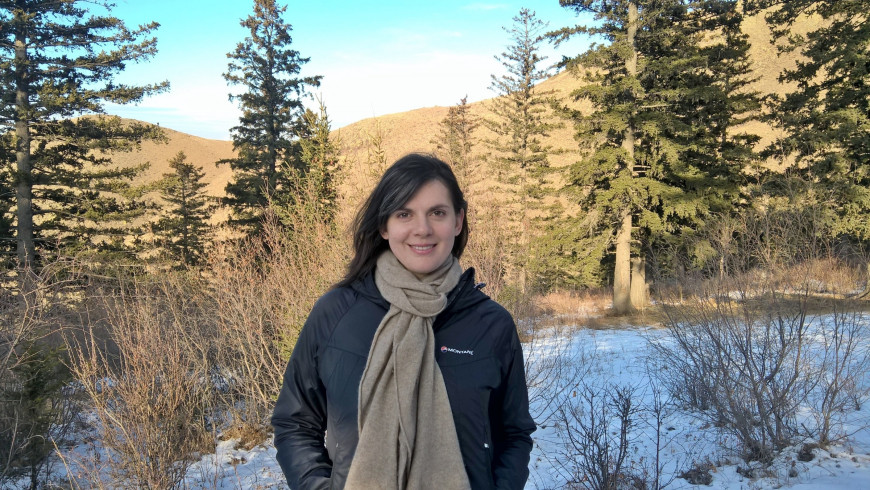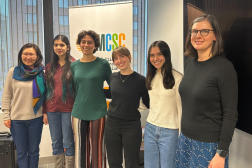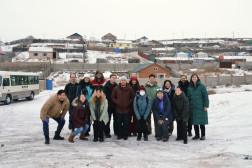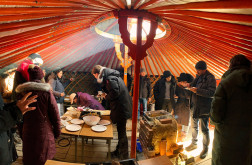Biography
>Lauren Bonilla is a geographer and anthropologist interested in how people envision and design pathways to social and ecological well-being, especially in spaces of uncertainty, change, or crisis. Lauren began her broad training as a social scientist at Macalester College, where she double majored in Anthropology and Geography. At Macalester, she became fascinated by transformations taking place in Mongolia, a country that has inspired her research trajectory for the last two decades. She obtained a PhD in Geography from Clark University, completing a dissertation that ethnographically tracked the evolution and impacts of Mongolia’s much-hyped 2011-2012 mining boom. She expanded that research as a postdoctoral researcher working with a team of anthropologists at University College London to examine emerging subjectivities amid economic flux in Mongolia. She joined MIT Anthropology in 2018, teaching a range of classes: anthropological approaches to international development, introduction to anthropology, technology and culture, disease and health, and anthro-engineering.
Lauren’s latest work focuses on developing engaged, collaborative anthropological approaches to sustainability education and solution-building as part of the “Anthro-Engineering Decarbonization at the Million-Person Scale” project. She has led two experiential learning trips to Mongolia for undergraduate students to research Ulaanbaatar's energy landscape and explore the design of a culturally relevant, affordable, and sustainable technology to help households decarbonize their heating.
Research
Collaborative Practices; Engineering Education; Political Ecology; Extractive Industry; Anthropology of Sustainability; Decarbonization
Selected Publications
| In preparation | with Iselle Barrios, “Anthro-Engineering: Putting People and Places First in Engineering Education, Research, and Design.” |
| 2023 | Review of Continent in Dust: Experiments in a Chinese Weather System, by Jerry Zee. Inner Asia 25: 159-161 |
| 2019 | Cultural Anthropology, Theorizing the Contemporary Online Series: Temporary Possession. https://culanth.org/fieldsights/introduction-temporary-possession with Rebecca Empson, “Introduction: Temporary Possession.” |
| 2018 | with Tuya Shagdar, “Electoral Gifting and Personal Politics in Mongolia’s Parliamentary Election Season.” Central Asian Survey 37(3): 457-474. |
| 2018 | “Dusty Encounters in Boom-time Tsogttsetsii.” In Hermione Spriggs (ed.) Five Heads (Tavan Tolgoi): Art, Anthropology, and Mongol Futurism. Sternberg Press. Pp 55-60. |
| 2018 | “Voluminous.” Cultural Anthropology, Theorizing the Contemporary Online Series: Speaking Volumes. https://culanth.org/fieldsights/voluminous |
News
3 Questions: Bridging anthropology and engineering for clean energy in Mongolia
Leda Zimmerman | School of Humanities, Arts, and Social Sciences | MIT News
October 2, 2024
Anthro-Engineering in Ulaanbaatar: MIT NEET Article | Powering the Future
Story by Jiyoo Jye, Head of Communications | NEET, MIT
May 22, 2023
Teaching
21A.S01
Anthro-Engineering Decarbonization at the Million Person Scale
This class explores and experiments with pathways of decarbonization at the million-person scale through an interdisciplinary “anthro-engineering” approach. By putting people first, we examine how user-centric design, holistic ally and stakeholder inclusion, responding to cultural and political constraints on clean energy issues, and working in and with diverse groups on open-ended problems can create impactful and equitable changes in energy systems. Students engage with anthropological approaches to energy, development, sustainability, and climate-related issues while simultaneously exploring the possibilities for practical, real-world intervention into an energy landscape dominated by fossil fuels.
21A.301
Disease and Health: Culture, Society, and Ethics
From a cross cultural and global perspective, examines how medicine is practiced, with particular emphasis on biomedicine. Analyzes medical practice as a cultural system, focusing on the human and social side of things. Considers how people in different societies think of disease, health, body, and mind
21A.500
Technology and Culture
Examines the intersections of technology, culture, and politics in a variety of social and historical settings ranging from 19th-century factories to 21st-century techno dance floors, from Victorian London to anything-goes Las Vegas. Discussions and readings organized around three questions: what cultural effects and risks follow from treating biology as technology; how computers have changed the way we think about ourselves and others; and how politics are built into our infrastructures. Explores the forces behind technological and cultural change; how technological and cultural artifacts are understood and used by different communities; and whether, in what ways, and for whom technology has produced a better world.
21A.00
Introduction to Anthropology: Comparing Human Cultures
Through the comparative study of different cultures, anthropology explores fundamental questions about what it means to be human. Seeks to understand how culture shapes societies, from the smallest island in the South Pacific to the largest Asian metropolis, and affects the way institutions work, from scientific laboratories to Christian mega-churches. Provides a framework for analyzing diverse facets of human experience, such as gender, ethnicity, language, politics, economics, and art.
21A.400
Stakes of International Development
Offers an anthropological perspective on international development. Students consider development, not in policy or technical terms, but through its social and political dynamics and its impacts on daily life. Examines the various histories of, and meanings given to, international development as well as the social organization of aid agencies and projects. Follows examples of specific projects in various parts of the world. Examples: water projects for pastorialists in Africa, factory development in Southeast Asia, and international nature parks in Indonesia.



